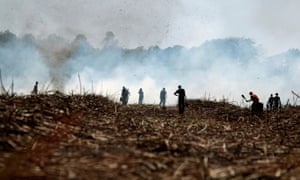The world is heating up at an alarming rate and world leaders are running out of chances to keep temperature rises below 1.5C, says Jonathan Watts.
Presented by Nosheen Iqbal with Jonathan Watts;
Produced by Sami Kent and Axel Kacoutié;
Executive producers Phil Maynard and Archie Bland
October 20, 2021
Until now, human civilisation has existed within a narrow, stable band of temperatures. But amid years of burning fossil fuels, we have gradually heated the planet. And suddenly things are not so gradual: since 1970, the Earth’s temperature has shot up faster than in any comparable period. The oceans have heated at a rate not seen in 11,000 years.
The Guardian’s global environment editor, Jonathan Watts, tells Nosheen Iqbal that after leaders agreed to limit temperature rises to 1.5C in Paris in 2015, now they must use the Glasgow summit next week to demonstrate how they will achieve that aim. The alternatives hardly bear thinking about.
Jason Glaser runs La Isla Network, an NGO advocating for outdoor workers in Central America. He has seen up close the damage working in extreme heat has done to people in the sugar-cane-cutting industry in Nicaragua. He describes people working in 40C heat with no protection from the sun – and the toll that can take. Each fraction of a degree that global temperatures rise makes extreme heatwaves more likely in some of the world’s poorest countries.
But as the days tick down to the start of the Cop26 climate summit, Jonathan says he is optimistic that by working together world leaders can make a meaningful difference and avert the disastrous scenarios in store for us if we get beyond 2, 3 or even 4C of heating.
(Sources: The Guardian)













Đăng nhận xét